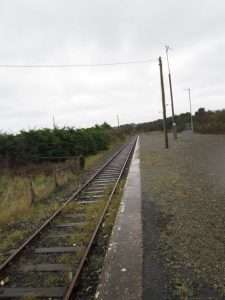There was the smell of a steam locomotive in the air outside of Portlaoise this morning, and if not a steam locomotive, something very similar. It is a distinctive smell, the smell of burned coal, the smell of heavy engineering, the smell of a lost past.
Being someone who has no understanding of machinery, for whom the number of wheels on an engine and the type of rolling stock it pulls are arcane matters, there is nevertheless a fascination in following the course of long closed lines and standing at derelict stations. A friend from the North comes from time to time and we spend a day searching for memories that will soon have gone. Moate to Mullingar; Waterford to Macmine Junction; Rosslare to Waterford; spurs and branch lines; narrow gauges and quaysides; each place is imbued with a sense of something indefinable.
Whether it is a line closed more than fifty years, or a line which remains nominally open, there are moments when one stands and ponders the industry demanded in building such lines, the ambitious investments, the technical skills, the hard labour, the countless people for whom the railways brought work – and hope. Maybe hope was the most significant factor: expectations of wealth for investors, aspirations to become successful among entrepreneurs, access to markets for factories and farmers, jobs for those who were prepared to travel. The prospect of travel itself changed communities; shopping, excursions, even holidays.
Perhaps the railway relics in the landscape will be regarded by future generations in the way monastic and ecclesiastical ruins are regarded today, as artifacts of a society whose ways and customs were very different. Perhaps the archaeologists in centuries to come will excavate sites where stations once stood and ponder the lives of those who travelled from these places, perhaps children will stand in museums and watch hologram trains making sedate progress along cuttings and embankments.
Perhaps there is a deeper fascination in days following the course of redundant railways, perhaps it is about connecting with deep childhood memories. Standing with my mother on the platform of Langport West station when not yet four years of age; watching the level crossing gates of the station at Martock swing open to allow the passage of a train, and to discover decades later that the line closed in 1964; being at Weymouth while very young and seeing a train travel the line through the streets on its way to the docks. There is something in redundant Irish railways that connects with memories of security and inexhaustible hope.
